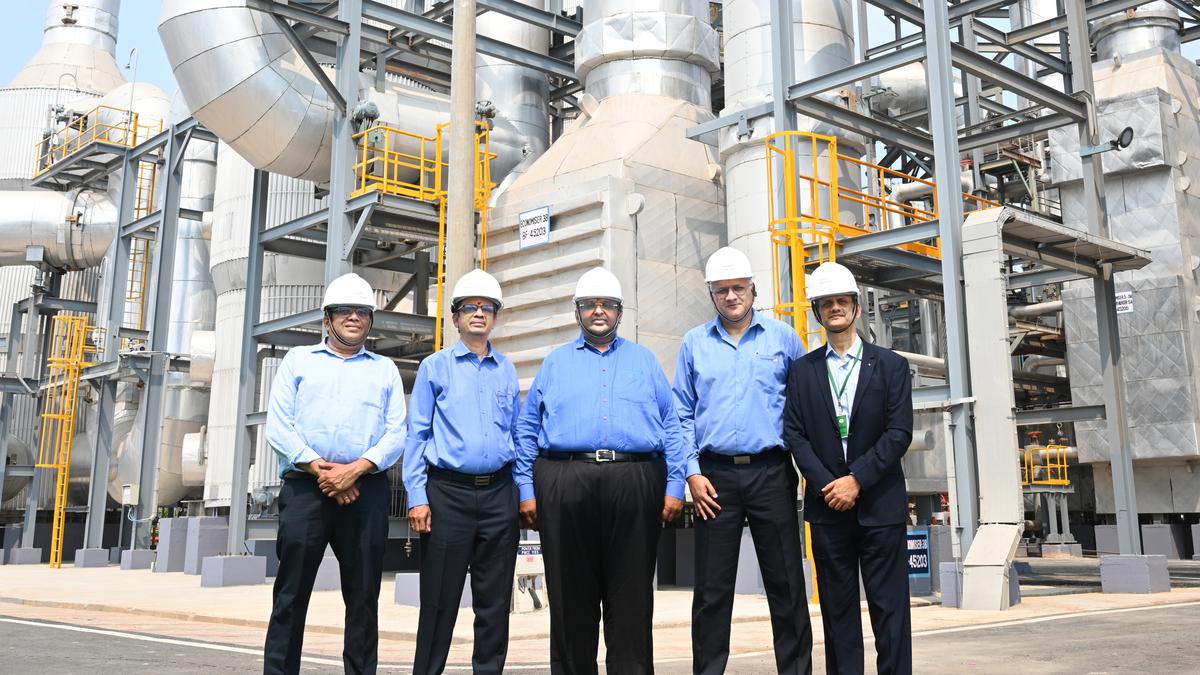
Coromandel commissions sulphuric acid plant in Vizag
The Hindu
Coromandel Intl. commissions ₹400 cr sulphuric acid plant in Visakhapatnam to strengthen backward integration & reduce import dependence. Plant has 1,650 tonnes/day production capacity & meets one of the lowest emission standards globally. Desalination plant also set up.
Agri input solution provider Coromandel International on Wednesday commissioned a sulphuric acid plant at its fertiliser complex in Visakhapatnam.
A move aimed at strengthening its backward integration capabilities towards driving self-sufficiency in operations, the plant is the third such at the complex in the port city and set up with an investment of ₹400 crore. The new facility, with a production capacity of 1,650 tonnes per day, will increase Coromandel’s sulphuric acid capacity to 11 lakh tonnes per annum from 6 lakh tonnes per annum.
The facility, which was inaugurated by executive vice-chairman Arun Alagappan, will support the requirement towards downstream processes involving phosphoric acid and phosphatic fertiliser production, the company said in a release.
Stating that the new sulphuric acid plant has been commissioned in a record time of 18 months, Mr. Alagappan said “this investment is in line with the company’s strategy of strengthening backward integration and ensuring supply security of key raw materials, promoting self-reliance in our operations.”
The plant is designed to meet one of the lowest emission standards globally and the steam generated from the facility will be used for captive power generation. A 6 MLD seawater desalination plant has also been set up to meet additional water requirements. Coromandel said it has partnered with Veolia Water Technology and Solutions for the desalination facility.
India is the third largest importer of sulphuric acid globally, importing nearly 20 lakh tonnes of acid per annum. With the commissioning of the new plant, the country’s import dependence will go down by 25-30%, Coromandel said, reiterating that it will continue to improve its raw material self-sufficiency and augment fertiliser availability for the farming community. The company has a production capacity of 3.5 million tonnes per annum of complex fertilisers.

In 2022, ActionAid conducted a survey to evaluate the status of RWH systems in Namma Metro infrastructure in Bengaluru. According to the ActionAid survey, an ideal RWH system includes pipes leading rainwater to percolate and recharge groundwater. However, their findings revealed that 8 pipes were found to be broken, 4 pits were clogged, 7 were filled with trash, 60 were not visible near the pillars, 5 water storage tanks were broken, among other problems in places where the system was implemented.

 Run 3 Space | Play Space Running Game
Run 3 Space | Play Space Running Game
 Traffic Jam 3D | Online Racing Game
Traffic Jam 3D | Online Racing Game
 Duck Hunt | Play Old Classic Game
Duck Hunt | Play Old Classic Game
















